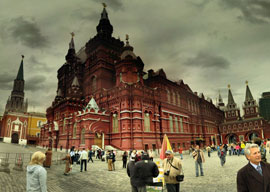
February 19, 2014

The Kremlin, Moscow
On the other hand, this logic can easily be circular. Why does the US want Sunni Muslim extremists to overthrow the religiously tolerant Syrian dictatorship? Because Putin’s backing Assad, and it’s crucial that Putin be humiliated in Syria to lessen his prestige in Ukraine. And why is it important to win in Ukraine? Because Syria…et cetera, et cetera.
Despite American machinations, Putin’s government did the Obama Administration a huge favor last September. After Obama promised unpopular military strikes against Syria for using chemical weapons, Russian Foreign Minister Sergey Lavrov pulled off a Nobel Peace Prize-worthy diplomatic coup by seizing upon a scoffing remark Secretary of State John Kerry made that international war could be averted only if Syria turned over “every single bit” of its WMDs. To the Obama Administration’s astonishment, Lavrov brokered a deal. As the weaker competitor, Russia has to be the more reasonable one.
The fundamental reason for the current anti-Russian jingoism is that”same as in a music hall in 1878″it’s fun. Nationalism is a blast. It’s a cliché to deplore conflict, yet human beings spend vast amounts of money arranging conflicts such as Olympic ice hockey. Likewise, nobody is negotiating to head off this coming summer’s World Cup clashes in Brazil.
(The trick, of course, is to make sure you wind up hosting the Super Bowl, not the First Battle of the Marne.)
In 2014, the global winds are blowing in favor of conservative nationalism. For example, the reason Obama is subsidizing what’s increasingly a right-wing rebellion in Ukraine isn’t because he wanted to, but because that’s who showed up to fight.
Israel has long been a leader in the ongoing swing to the right, with India likely to join in if the Hindu nationalists take power this year.
Some of this political drift is substantive and productive: Massive immigration keeps being rejected whenever publics around the world are allowed to vote on it. Other examples are zero-sum games, such as the East Asian disputes over oil-drilling rights around uninhabited islands in the Pacific.
The horrors of World War I discredited jingoism in the West. But the rate of international warfare keeps dropping, as Steven Pinker documented in his 2011 book The Better Angels of Our Nature. If war is increasingly obsolete, the current thinking seems to go, why not indulge in the pleasures of jingoism?
A century before Pinker, Norman Angell published The Great Illusion, arguing that war between advanced states would no longer pay. And, as WWI and WWII showed, he was right. Today, the United States and Israel remain bellicose, but less privileged countries are learning that cross-border warfare is unprofitable. For example, Georgia seemed to think in 2008 that attacking Russian-held territory would bring in either America or Israel on its side, but its war of choice devolved into farce.
Civil wars continue apace in 2013. Asymmetrical fighting between an advanced army and guerillas remains common, suggesting that the cost of holding conquered land is bound to be high. But a symmetrical land battle between two modern armies sounds increasingly implausible. The accuracy and firepower of modern weaponry is becoming too much for humans to even imagine bearing.
For example, when was the last tank-v.-tank battle? The History Channel’s documentary series Greatest Tank Battles features 20 episodes running from the Battle of the Somme in 1916 to the Battle of 73 Easting in the Gulf War of 1991. There were some tank engagements in the US invasion of Iraq in 2003. But in the last ten years, the only tank battle I can find mention of is a small-scale 2008 Russian-Georgian engagement in South Ossetia.
Of course, optimism about a peaceful future seemed sensible 100 years ago, too.
The two countries that have the tanks, terrain, and mutual border to conceivably replay the Battle of Kursk are Russia (2,562 tanks in service and plenty more in reserve) and Ukraine (725 tanks running). Most likely, the great majority of those tanks are going to rust unused. Fighting in the future will probably be the task of volunteers who enjoy it, such as those masked men in Kiev.
Then again, I could be wrong. So maybe it’s not such a good idea for America to try and provoke a fight?